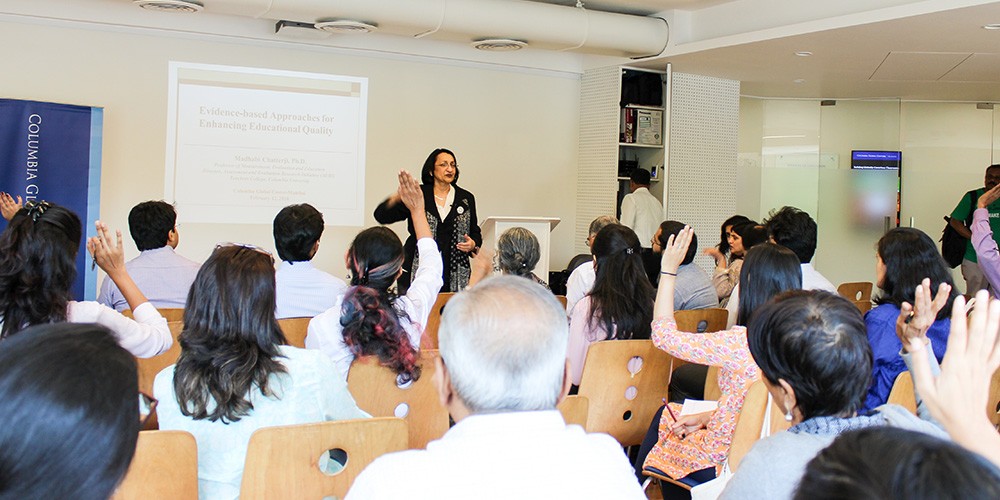Evidence-Based Approaches to Enhancing Educational Quality

Despite governments highlighting ‘education for all’ as a policy, ensuring access to quality education remains one of the greatest challenges for stakeholders around the world. In this context, it is important for education systems to locate the best available educational tools and practices. For India, with its sizeable population, it becomes equally important to understand how these tools and practices can appropriately be designed to reflect the scale of its population.
To address the challenges of measurement in the education system and share latest research in the field, Columbia Global Centers | Mumbai organized a workshop on February 12 for academics, educators and stakeholders entitled ‘Evidence-Based Education (EBE) for Enhancing Educational Quality.’ The workshop was led by Madhabi Chatterji, Professor of Measurement, Evaluation, and Education and Founding Director of the Assessment and Evaluation Research Initiative at Teachers College, Columbia University.
Professor Chatterji described EBE as guided by research-supported practices, placing value in a work culture that recognizes the importance of evaluations, and building organizational capacity that goes beyond individual expertise to promote systemic learning. This, she said, puts an organization on the path of sustained improvements in learning outcomes.
She traced EBE’s roots to medicine and the pioneering work of Dr. David Sackett who popularized the field of evidence-based medicine. As the field developed, double blinded randomized controlled trials (RCTs) became the benchmark, producing clear results in highly controlled environments. These methodologies, however, could not immediately be applied to the field of education because learning environments are complex social ecosystems. For example, how does a school measure the effectiveness of a specific educational method if a child’s learning is also supplemented by independent instruction at home or elsewhere?
To overcome this challenge, Professor Chatterji recommended adopting new frameworks for evidence gathering that are both quantitative and qualitative. This could help move research design and program intervention away from a rigid, one-size-fits-all approach. She highlighted the L.E.A.D. Framework for Evidence-based Practices in Public Health, which she helped create, as a model that goes beyond RCTs while maintaining rigorous, credible and systems-based standards. “Along the way, we make sure that we have a systems perspective and each time we find a gap where there is no evidence, we create an opportunity for new research, new evidence creation that has to be funded,” she said.
According to her, such frameworks can take EBE applications from traditional, linear approaches to a more systems-based model that is better rounded to accommodate environment and case-based variables. Such a systems approach could also create opportunities for feedback, leading to a continuous quality improvement loop in organizations. The significance of evaluation is growing globally and evidence-based practices are being integrated into programs at different levels. It is now necessary to champion capacity building measures on this front by involving education stakeholders, policymakers and students in improving systems of learning, helping serve their long-term goals of social betterment.
The Mumbai Center plans to partner with Professor Chatterji in developing long-term and sustained programs on evidence-based education.